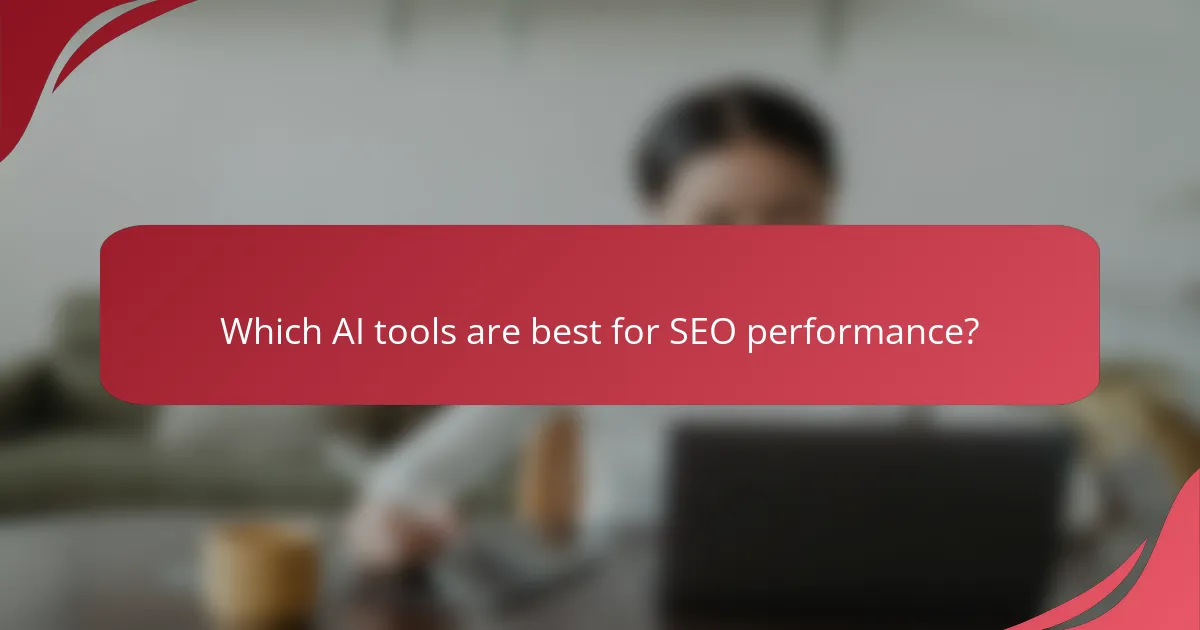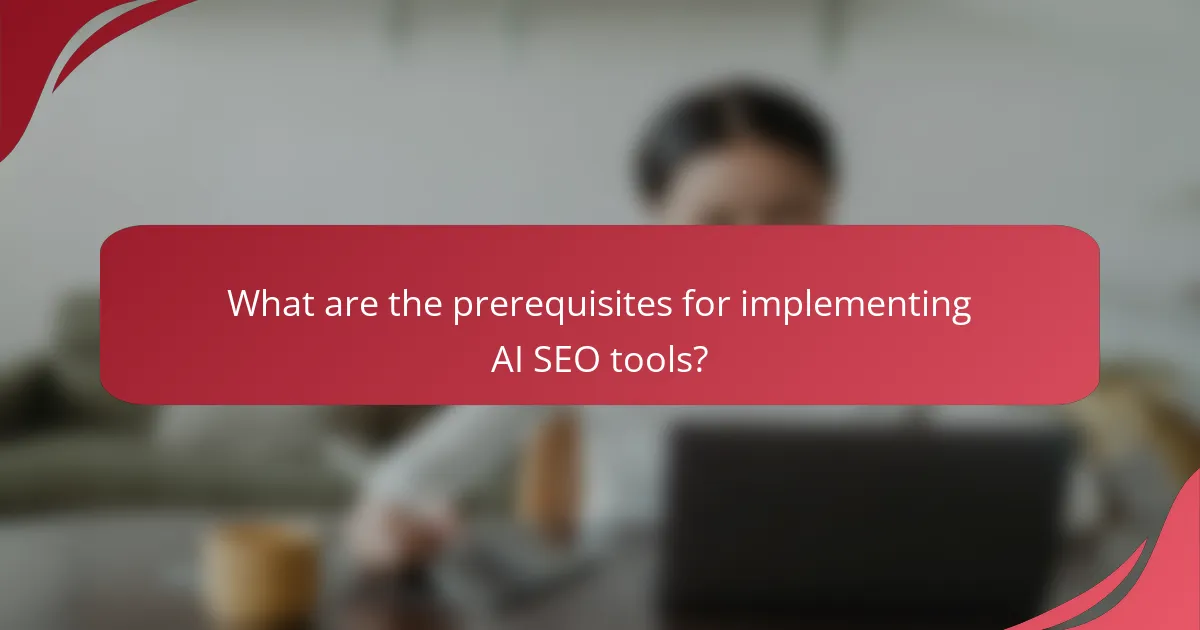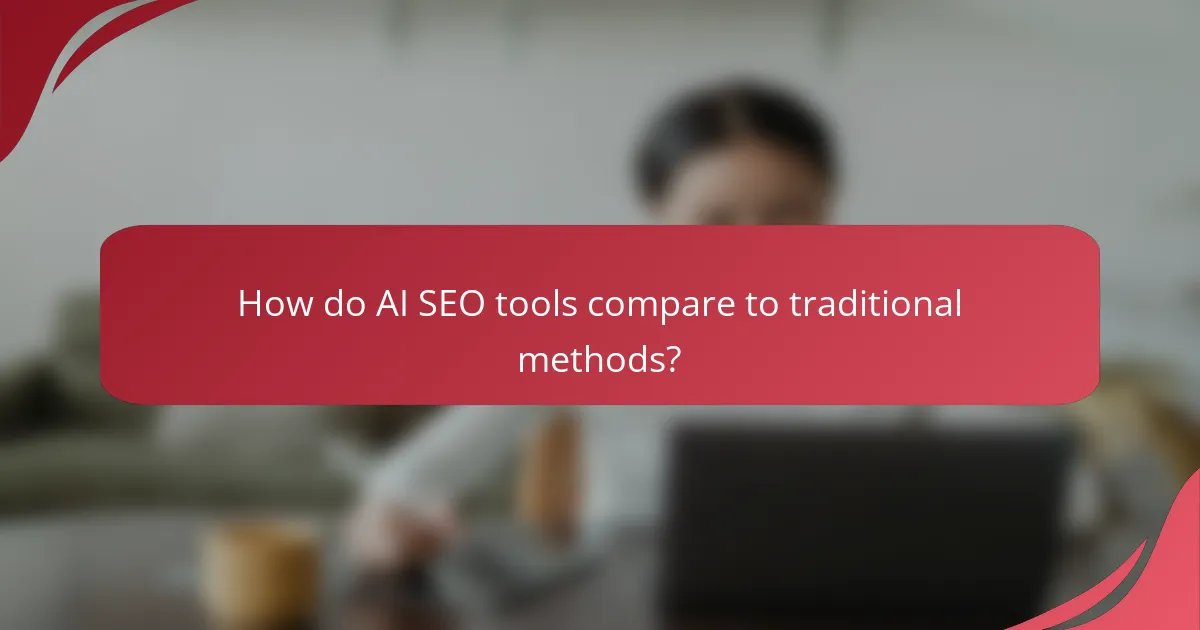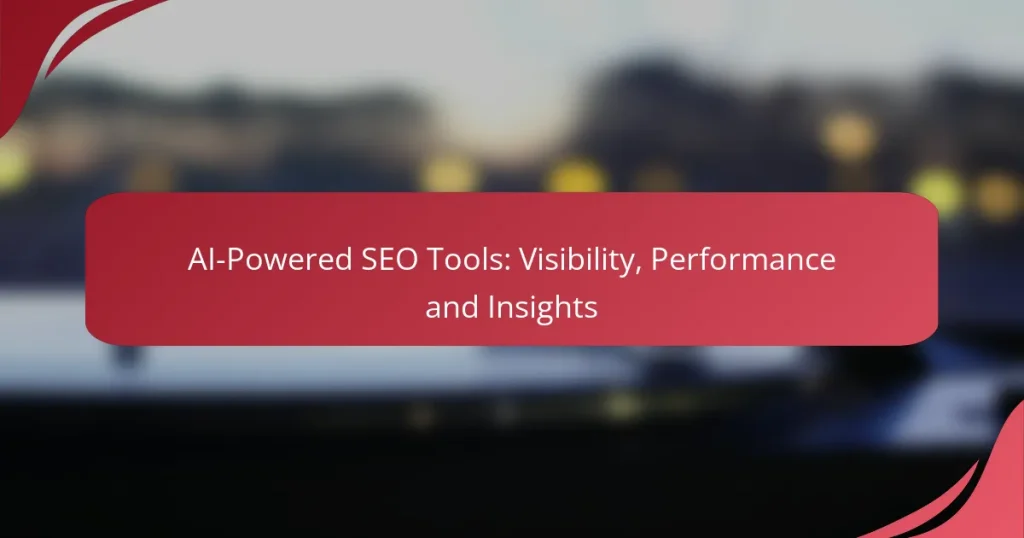AI-powered SEO tools are revolutionizing the way businesses enhance their online visibility and performance. By optimizing website content and structure, these tools make sites more discoverable to search engines while providing valuable insights into customer behavior and market trends. With options like SEMrush, Ahrefs, and Surfer SEO, users can leverage advanced features tailored to boost organic traffic and improve search rankings.

How can AI-powered SEO tools improve visibility?
AI-powered SEO tools enhance visibility by optimizing website content and structure, making it more discoverable to search engines. These tools analyze data patterns to recommend strategies that increase organic traffic and improve search rankings.
Increased keyword optimization
AI tools analyze vast amounts of search data to identify high-value keywords that can drive traffic. They suggest not only primary keywords but also long-tail variations that are often less competitive yet highly relevant.
For effective keyword optimization, consider using tools that provide insights into keyword difficulty and search volume. Aim for a balanced mix of short and long-tail keywords to capture diverse search intents.
Enhanced content recommendations
AI-powered tools can analyze existing content and suggest improvements or new topics based on trending searches and user interests. This ensures that your content remains relevant and engaging to your target audience.
Utilize these recommendations to create content that answers common questions or addresses current trends. Regularly updating your content based on AI insights can significantly boost user engagement and search rankings.
Automated performance tracking
Automated performance tracking allows you to monitor key metrics such as organic traffic, bounce rates, and conversion rates without manual effort. AI tools provide real-time analytics, helping you understand what strategies are working and where adjustments are needed.
Set up regular performance reports to keep track of your SEO efforts. Use these insights to refine your strategies, focusing on areas that show potential for improvement, such as underperforming keywords or pages.

Which AI tools are best for SEO performance?
Several AI tools stand out for enhancing SEO performance, each offering unique features tailored to specific needs. SEMrush, Ahrefs, and Surfer SEO are among the top choices, providing insights into competitive analysis, backlink tracking, and content optimization, respectively.
SEMrush for competitive analysis
SEMrush excels in competitive analysis by allowing users to track their competitors’ strategies and performance metrics. It provides insights into keywords, traffic sources, and ad campaigns, enabling businesses to identify gaps and opportunities in their own SEO strategies.
To effectively use SEMrush, start by entering your domain and analyzing the dashboard for competitor insights. Look for keywords that competitors rank for but you do not, and consider targeting those to improve your visibility. Regularly monitoring these metrics can help you stay ahead in your niche.
Ahrefs for backlink tracking
Ahrefs is a powerful tool for backlink tracking, offering comprehensive data on your site’s link profile and that of your competitors. It helps identify high-quality backlinks, which are crucial for improving domain authority and search rankings.
Utilize Ahrefs to analyze your backlinks and discover potential link-building opportunities. Focus on acquiring links from reputable sites within your industry to enhance your site’s credibility. Regularly check for lost backlinks and consider strategies to regain them, as they can significantly impact your SEO performance.
Surfer SEO for content optimization
Surfer SEO specializes in content optimization by analyzing top-performing pages for specific keywords. It provides actionable recommendations on word count, keyword usage, and structure, helping you create content that ranks well in search engines.
When using Surfer SEO, input your target keyword and review the optimization score. Follow the suggested adjustments to align your content with what is currently ranking. Aim for a balance of keyword density and natural language to ensure your content is both SEO-friendly and engaging for readers.

What insights can AI tools provide for e-commerce?
AI tools can deliver valuable insights for e-commerce by analyzing data related to customer behavior, market trends, and conversion rates. These insights help businesses optimize their strategies and improve overall performance.
Customer behavior analysis
AI tools can track and analyze customer interactions on e-commerce platforms, providing insights into purchasing patterns, preferences, and engagement levels. By understanding how customers navigate a site, businesses can identify which products attract attention and which pages lead to drop-offs.
For instance, tools may reveal that customers frequently abandon their carts at a specific point in the checkout process. This information allows businesses to streamline that step, potentially increasing sales. Regularly reviewing customer behavior data can help refine marketing strategies and enhance user experience.
Market trend identification
AI can analyze vast amounts of data to identify emerging market trends, helping e-commerce businesses stay ahead of the competition. By examining search queries, social media activity, and sales data, AI tools can highlight shifts in consumer interests and preferences.
For example, if an AI tool detects a rising interest in sustainable products, a retailer can adjust inventory and marketing efforts accordingly. Keeping an eye on these trends enables businesses to adapt quickly and align their offerings with current consumer demands.
Conversion rate optimization
AI tools can significantly enhance conversion rates by analyzing the factors that influence customer decisions. By testing various elements of a website, such as layout, product descriptions, and images, AI can determine which combinations lead to higher sales.
Implementing A/B testing through AI can reveal the most effective strategies for engaging customers. For instance, changing a call-to-action button’s color or position might lead to a noticeable increase in clicks. Regularly optimizing these elements based on AI insights can lead to sustained improvements in conversion rates.

How to choose the right AI SEO tool?
Choosing the right AI SEO tool involves evaluating features, pricing, and user feedback. Focus on tools that align with your specific needs, whether it’s keyword research, content optimization, or performance tracking.
Evaluate features and pricing
Start by identifying the essential features you need, such as keyword analysis, backlink tracking, or site audits. Compare the pricing models of different tools, which can range from monthly subscriptions to one-time fees, ensuring they fit within your budget.
Many tools offer tiered pricing based on features. For example, a basic plan may start around $30 to $50 per month, while more comprehensive options can exceed $100. Assess whether the additional features justify the cost for your specific use case.
Consider user reviews and case studies
User reviews provide insights into the effectiveness and usability of AI SEO tools. Look for feedback on platforms like G2 or Trustpilot, focusing on comments about customer support, ease of integration, and overall satisfaction.
Case studies can illustrate real-world applications and results achieved with the tool. Seek out examples relevant to your industry to understand how the tool has helped similar businesses improve their SEO performance.

What are the prerequisites for implementing AI SEO tools?
To effectively implement AI-powered SEO tools, organizations need a solid data infrastructure and a team equipped with the necessary training and expertise. These factors ensure that the tools can be utilized to their full potential, driving visibility and performance in search engine optimization.
Existing data infrastructure
A robust data infrastructure is essential for AI SEO tools to function effectively. This includes having clean, organized, and accessible data from various sources such as website analytics, user behavior, and keyword performance. Companies should assess their current data management systems to identify gaps and ensure compatibility with AI technologies.
Consider implementing data warehousing solutions or cloud storage options that facilitate easy access and integration of data. Regular audits of data quality can help maintain accuracy, which is crucial for AI algorithms to deliver actionable insights.
Team training and expertise
Having a knowledgeable team is critical for maximizing the benefits of AI SEO tools. Team members should be trained in both SEO principles and the specific functionalities of the AI tools being used. This dual expertise allows for better interpretation of data and more effective strategy development.
Invest in ongoing training programs and workshops to keep the team updated on the latest trends and technologies in AI and SEO. Collaborating with AI specialists or consultants can also provide valuable insights and accelerate the learning curve for your team.

How do AI SEO tools compare to traditional methods?
AI SEO tools significantly enhance visibility and performance compared to traditional methods by leveraging advanced algorithms for data analysis and insights. These tools automate processes, provide real-time data, and adapt to changing trends more efficiently than manual techniques.
Speed of data processing
AI SEO tools process vast amounts of data in a fraction of the time it takes traditional methods. While manual analysis can take hours or even days, AI tools can deliver insights in low tens of milliseconds, allowing for quicker decision-making and strategy adjustments.
This speed is crucial for businesses that need to respond rapidly to market changes or competitor actions. For instance, an e-commerce site can quickly analyze customer behavior and adjust its marketing strategies accordingly, enhancing overall performance.
Accuracy of insights
AI-powered tools provide more accurate insights by utilizing machine learning algorithms that continuously improve over time. Unlike traditional methods, which may rely on outdated data or subjective interpretations, AI tools analyze current trends and patterns, resulting in insights that reflect the latest market conditions.
For example, an AI tool might identify emerging keywords that are gaining traction, enabling businesses to optimize their content strategy effectively. This level of accuracy helps in making informed decisions that can lead to higher conversion rates.
Scalability for e-commerce
AI SEO tools offer superior scalability for e-commerce businesses, allowing them to manage and optimize large inventories and multiple product categories efficiently. Traditional methods often struggle with the volume of data generated by extensive product lines, leading to missed opportunities.
With AI, e-commerce platforms can automate keyword tracking, content optimization, and competitor analysis across thousands of products simultaneously. This scalability ensures that businesses can grow without sacrificing the quality of their SEO efforts, ultimately driving more traffic and sales.

What are the emerging trends in AI-powered SEO?
Emerging trends in AI-powered SEO focus on enhancing visibility and performance through advanced algorithms and data analysis. These tools leverage machine learning to optimize content, improve user experience, and provide actionable insights for better search engine rankings.
Voice search optimization
Voice search optimization is increasingly important as more users rely on voice-activated devices for queries. This trend requires a shift in keyword strategy, emphasizing natural language and conversational phrases that align with how people speak rather than type.
To effectively optimize for voice search, consider using long-tail keywords and focusing on local SEO. For instance, instead of targeting “best pizza,” aim for “best pizza near me” or “where can I find the best pizza in [City].” This approach aligns with the way users phrase their questions verbally.
Common pitfalls include neglecting mobile optimization and failing to provide concise answers to potential questions. Ensure your content is structured to answer queries directly and consider using schema markup to enhance visibility in voice search results.


